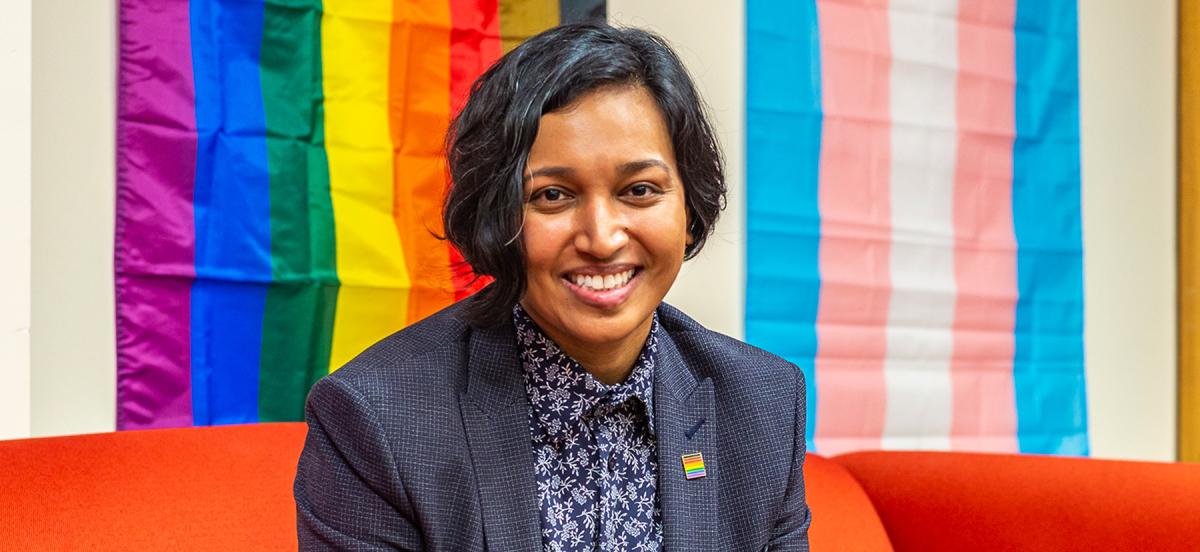GRASE-ful New Leadership

Sayeeda Rashid became the director of the Center for Gender Resources and Sexual Education in January. Before then, they worked at the Philadelphia Mayor’s Office of LGBT Affairs and the Pennsylvania Immigration and Citizenship Coalition. Photo by Patrick Montero.
Details
Four questions with Sayeeda Rashid, director of the Center for Gender Resources and Sexual Education.
Since taking over as director of the Center for Gender Resources and Sexual Education (GRASE) in January, Sayeeda Rashid has really been busy. Using feedback gathered from students, faculty, and staff, Rashid has relaunched GRASE with new programming and an improved website while tackling some of the College’s LGBTQ+ access policies. New initiatives include a monthly Community Conversation Series centered on intersectionality, justice, and resilience, and “Our Roots: QTBIPOC Radical Healing Space,” which offers workshops and events promoting the stories of Queer and Trans Black, Indigenous, and People of Color. In April, the College held its first Campus Pride Month.
GRASE was established as the Women’s Center in 1981 to support women dealing with gender-based discrimination and violence as the College went coed. It was renamed in 2020 to reflect its expanded commitment to LGBTQ+ students.
Rashid’s previous work at the Philadelphia Mayor’s Office of LGBT Affairs and the Pennsylvania Immigration and Citizenship Coalition (PICC) helped prepare them for this work. At the former, they developed citywide initiatives and policies, including a legislative package that, among other things, amended the city’s anti-discrimination ordinance to reflect updated understanding of sexual orientation and gender identity. At PICC, Rashid worked with grassroots immigrants’ rights organizations, gaining insight into fundraising, budgeting, and shared decision-making.
Rashid, who identifies as a proud queer, nonbinary Bangladeshi person, received their bachelor’s degree in psychology from Mount Holyoke College and has an MS in nonprofit leadership and an MSW from the University of Pennsylvania. They were recently awarded the 2022 LGBTQ+ Leadership Award from the Pennsylvania Diversity Council.
What inspired you to a career of social justice and advocacy?
Fighting for liberation and social justice is in my blood. I grew up hearing about my mom’s oldest brother, a Freedom Fighter who fought for Bangladesh’s independence during 1971’s Liberation War. I’ve always found myself drawn to activism and healing, and my professional positions have helped me better understand system change. Last summer, my father started to talk about the war—what it was like for him and the ways he and his family, and my mother’s family, took part in the movement. The more I learn about my roots, the prouder I become and the more inspired I am to do this work.
Why come to Haverford to lead GRASE?
I wanted to work where there was power in organizing, and that’s part of Haverford’s history and culture. When I arrived on campus, I saw a strong need for community and an equitable environment for LGBTQ+ students. I want to curate programs that are consistent and sustainable, while facilitating an institutional and cultural shift in LGBTQ+ advocacy. For example, we have a gender-neutral language policy, and people can add their pronouns to their bios, but there are differences between policy, practice, and culture.
Why was Campus Pride Month one of your first major events?
This is the first time in 40 years that my role as GRASE director is full-time. The students had done a lot of work leading [the Women’s Center] in between directors, and I thought, “What can we do to create moments of joy while highlighting the strengths of our LGBTQ+ students?” April’s campus-wide pride events brought us all together. The Drag Ball drew more than 200 people, some of whom had tears in their eyes because the event meant so much to them.
The LGBTQ+ community is under attack nationwide. How can Haverford students respond?
It is horrific that, as of mid-April, almost 240 anti-LGBTQ bills have been introduced in state legislatures, including Pennsylvania’s. Haverford students are change-makers. They’re hungry to lead and to do the right thing. It’s my role to guide them and create success strategies. Before the Women’s Lacrosse Pride Game, I spoke to Athletic Director Danielle Lynch, some coaches, and the LGBTQ+ student athletes group about the proposed Pennsylvania legislation. On game day, athletes spoke about the bill’s threats, and students could sign letters opposing the proposed law.



